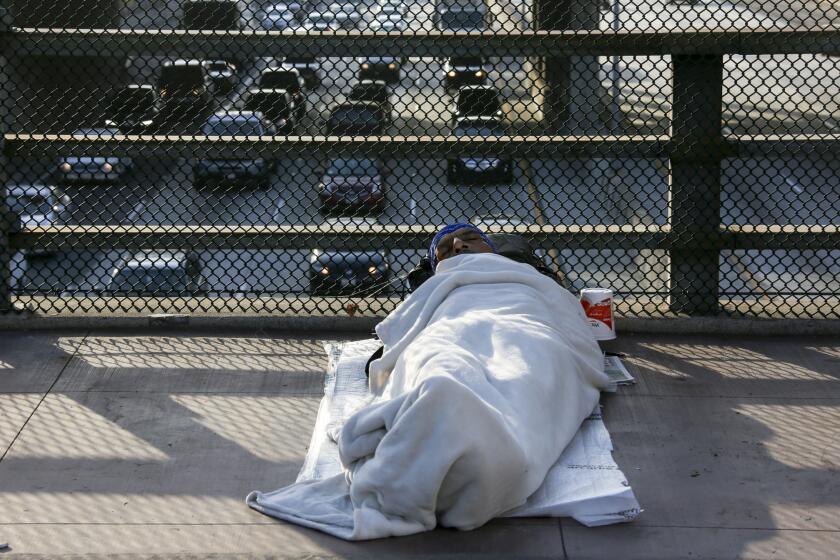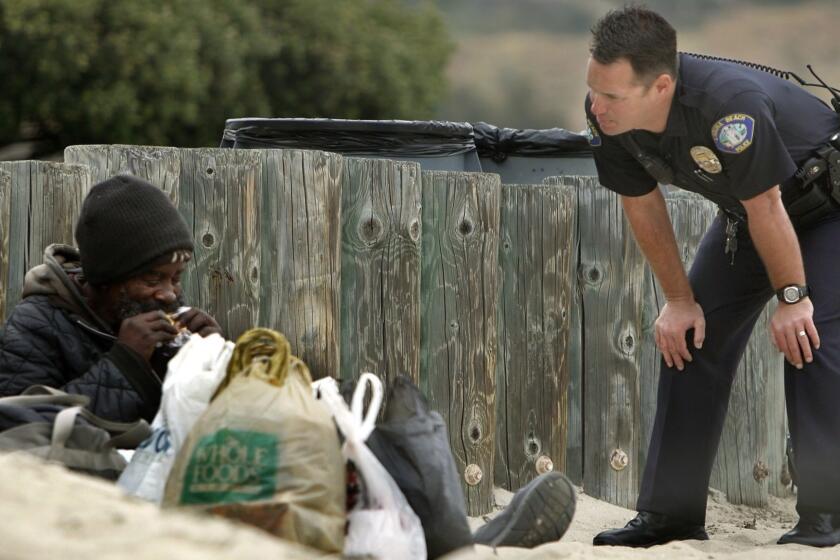Majority says police should do more to clean L.A. streets clogged with homeless camps, Times poll finds
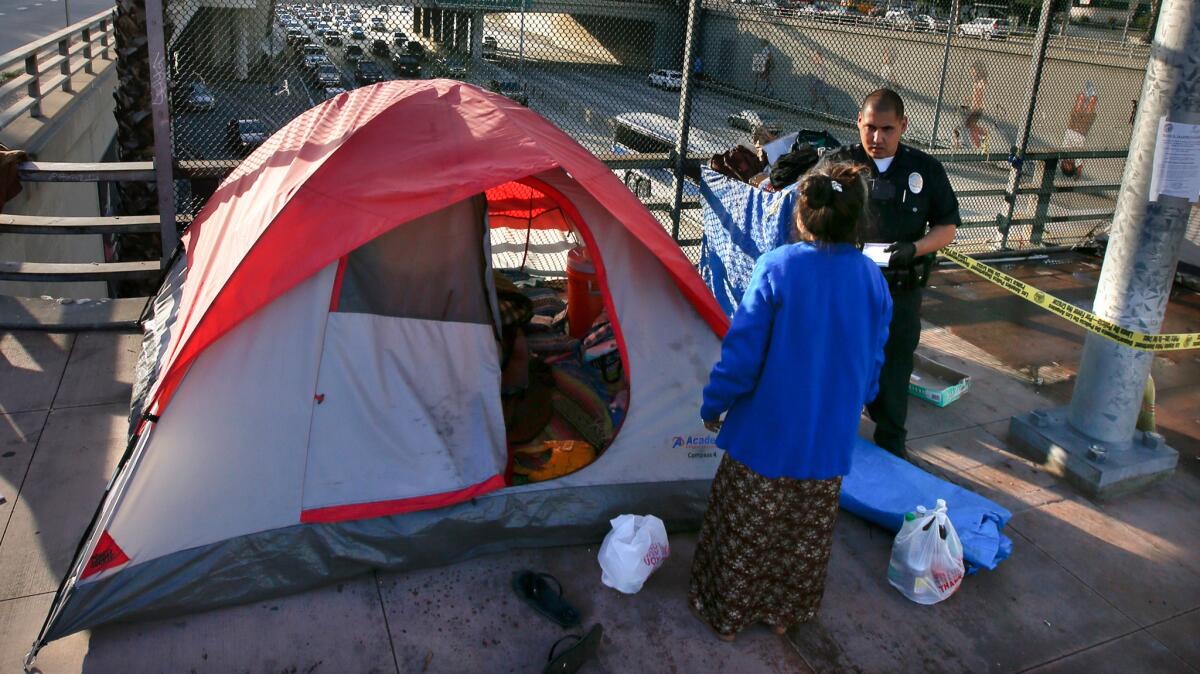
- Share via
With tens of thousands of people sleeping outside every night in L.A. County, one of the most contentious debates is over what to do about homeless encampments and who should do it.
A new poll conducted for the Los Angeles Times and the Los Angeles Business Council Institute found that a sizable majority of voters countywide think law enforcement should assume a larger role, despite court rulings and settlements limiting such involvement.
In total, 65% of respondents agreed that police should be more involved in cleaning up the streets “in order to address the health crisis that is mounting due to unsanitary conditions caused by homeless encampments.” Similarly, 63% agreed that homeless people “shouldn’t be allowed to degrade residential neighborhoods or block access to offices and commercial buildings, so police departments should prevent people from sleeping on the street.”
Of the 901 registered voters surveyed countywide, 39% said they “strongly agreed” with each of those statements.
“We need to make it illegal to live on the street and we need to start sorting people out, meeting their needs, whether it’s mental institutions or drug issues,” said Tim Russell, a Los Angeles voter who was part of a focus group conducted with the poll. “Whatever their issues are, we need to start addressing those.”
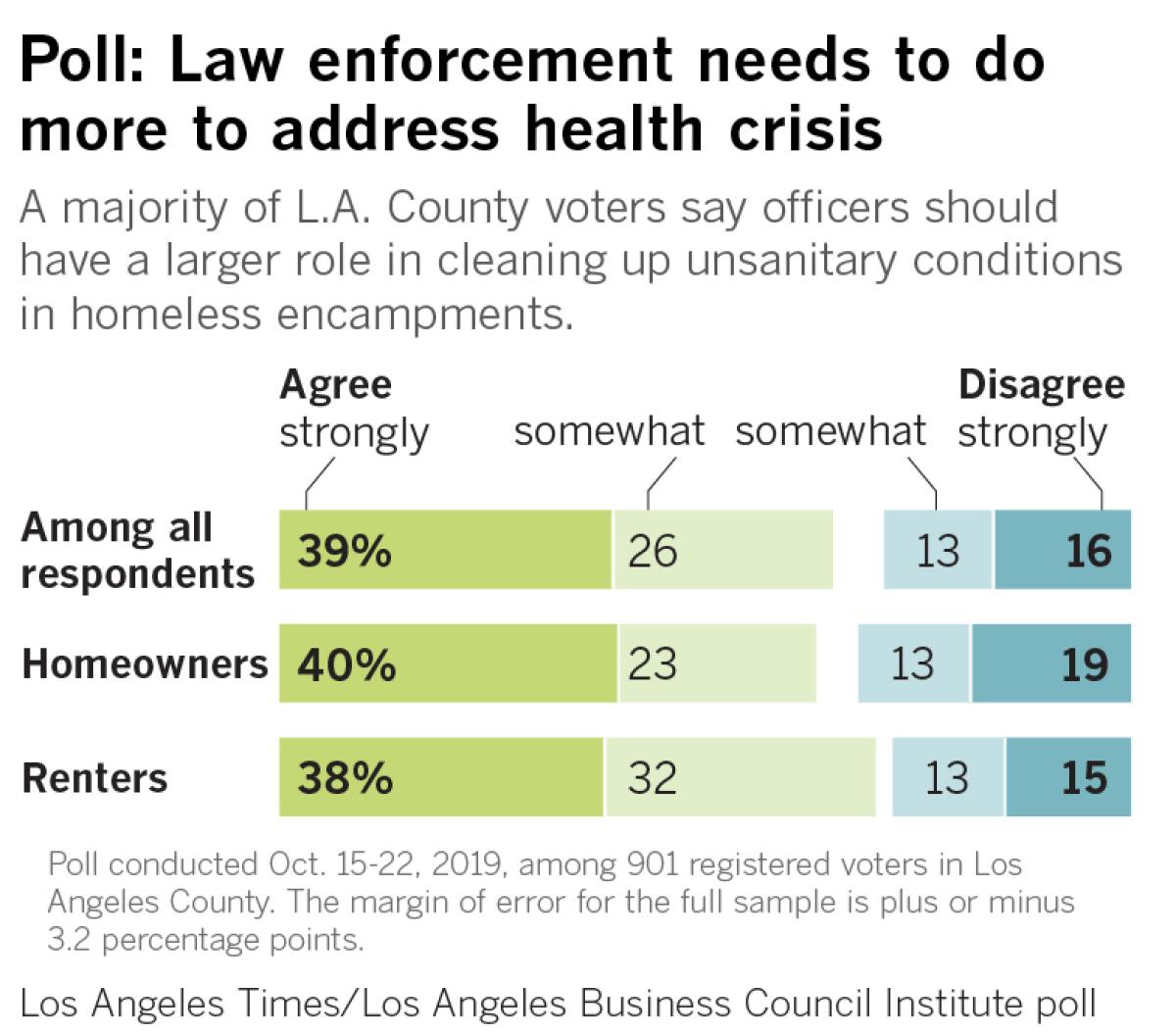
Most poll respondents, however, didn’t blame a lack of police enforcement for causing the recent rise in homelessness in L.A. County.
Among those in the focus group, there also was widespread consensus that it would be unproductive for law enforcement to be primarily involved in interacting with homeless people because it wouldn’t be a long-term solution. Still, a significant number of the participants felt that it should be against the law to sleep on public property.
The results of both the poll and the focus group point to rising public anger and a sense of helplessness over encampments, as the homeless population has skyrocketed to nearly 60,000 countywide and government has struggled to keep up with the growing number of tents and makeshift shelters that have spread into almost every corner of L.A.
“I don’t think there’s an inherent right to sleep on the sidewalk,” Mayor Eric Garcetti said in an interview. “Before that [statement] becomes like a protest outside, there’s a huge caveat. I agree with the court findings that it is inhumane to start doing that if there’s no place for them to go.”
Here are the full results of the Los Angeles Times/Los Angeles Business Council Institute homeless poll
Cities and counties across nine Western states, including California, are anxiously awaiting a decision from the U.S. Supreme Court on whether it will hear an appeal of the landmark Martin vs. City of Boise case. In that case, the 9th Circuit U.S. Court of Appeals ruled last year that the U.S. Constitution forbids criminally punishing homeless people for sleeping on public property when shelter beds or housing are not available.
Both the city and county of Los Angeles have joined dozens of other municipalities in submitting friend-of-the-court briefs, urging the Supreme Court to hear a challenge to the Boise case. Word about whether the court will hear the case could arrive by December.
Separately, the city of L.A., prompted by a lawsuit, agreed in a settlement to let homeless people sleep on sidewalks between 9 p.m. and 6 a.m. if they stay far enough from doorways and driveways.
Both the ruling and the settlement have made it more difficult to enforce anti-camping ordinances and clear homeless encampments in L.A. County.
Elsewhere in California, some cities, including Modesto, have created sanctioned tent encampments as a stopgap measure until more resources can be devoted to building shelters and permanent housing.
Last Friday, L.A. City Councilman Paul Koretz introduced a plan to explore creating designated sites for “well-managed” homeless encampments that could include bathrooms, trash pickup, outreach and security. He cited Modesto as a model.
The Times poll found a desire for government to find locations and build shelter so homeless people can retreat from the streets. But respondents also showed a general unwillingness to allow people to stay on public property.
Thirty percent said they think society has gone too far in upholding the rights of homeless people at the expense of housed residents, according to the poll. Twenty-four percent said the opposite, while 19% said the correct balance has been struck, and 12% said they did not think the interests of the two groups differed.
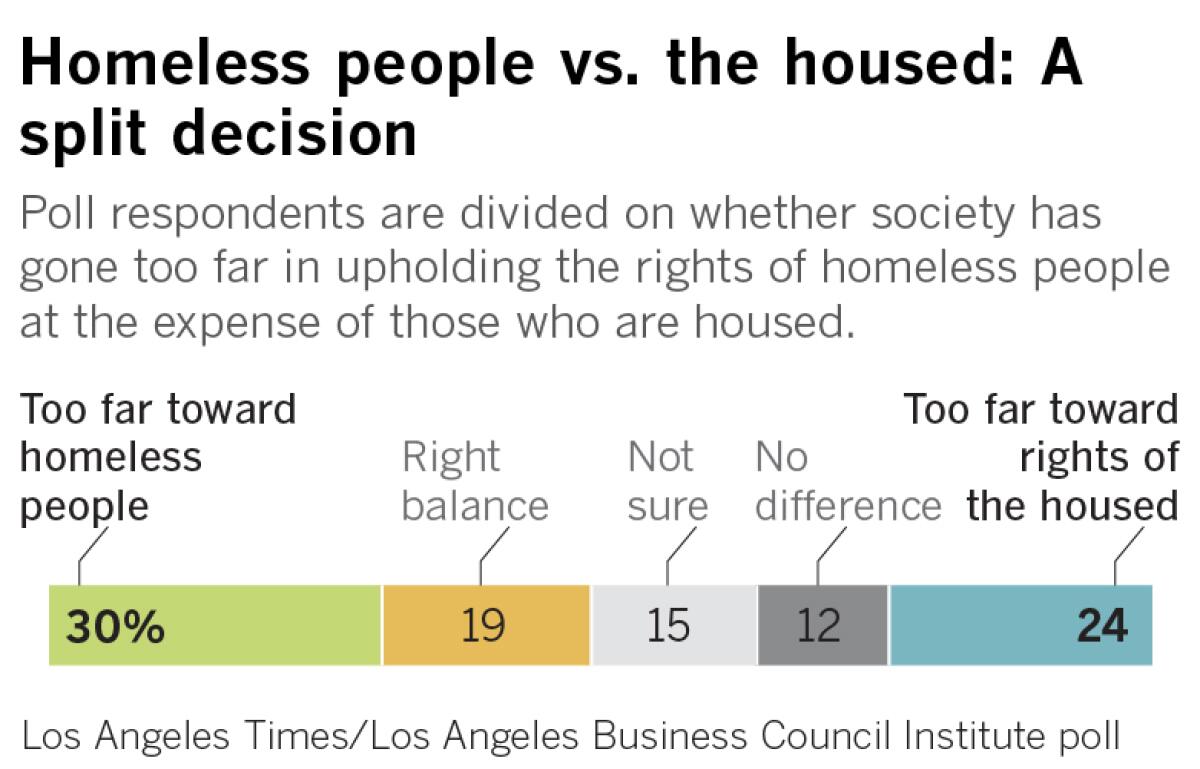
Asked if homeless people “should have the right to live on sidewalks and keep their property with them, even if that makes it inconvenient for local store owners or nearby pedestrians,” as long as there are not enough homes or shelters, 60% said no. That includes 41% who said they “strongly” disagreed with that statement, which is the main thrust of the Boise ruling.
“This is why I think Boise is problematic,” said Los Angeles County Supervisor Mark Ridley-Thomas. “Government should find a way to cause people to have a roof over their head, not take the position by court decisions to say let them remain on the streets.”
Amid protest, Ridley-Thomas, who is co-chair of the state’s task force on homelessness, voted for the county to file a brief urging the Supreme Court to hear a challenge to the case. Supervisor Sheila Kuehl voted against the motion.
“Shelters, police, drug treatment and mental health beds are pieces of a comprehensive solution, but not the whole solution,” Kuehl said in a statement. “Crisis response has to be balanced with long-term fixes like rent stabilization and land use policies that promote and retain affordable housing.”
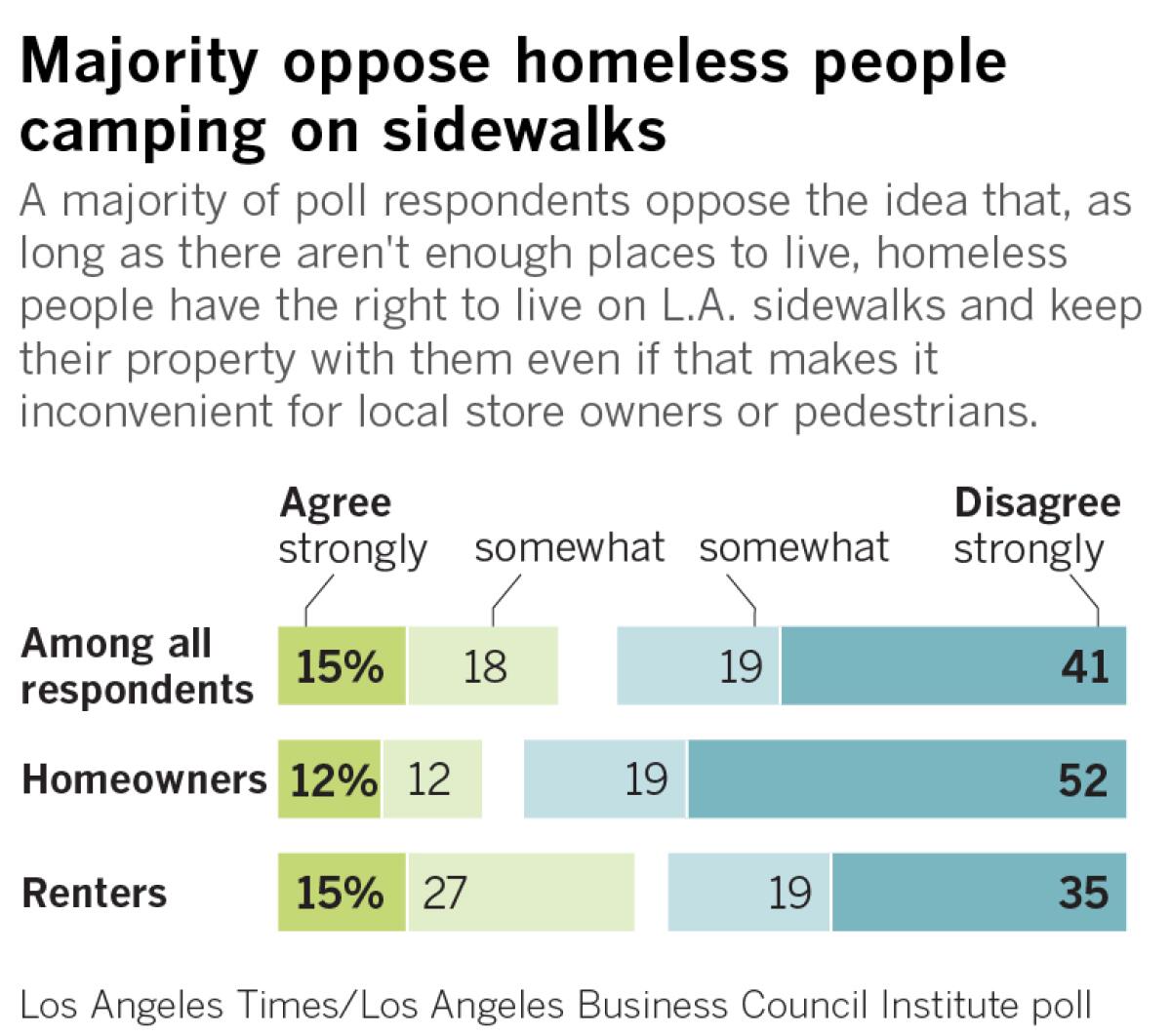
For years, activists have decried the ways in which law enforcement, government and some residents treat homeless people. They say the focus should be on finding solutions to homeless people’s problems, rather than trying to sweep them out of sight.
Recently, Los Angeles voided millions of old tickets and warrants issued to poor and homeless people, but the Los Angeles Police Department has said it has no plans to completely stop writing citations for minor “quality of life” violations, such as leaving a tent in a public space during the day.
In September, protests erupted at City Hall as officials considered drafting new rules that would ban people from sleeping on some streets and sidewalks near schools, parks, day-care centers and other types of facilities.
This poll on homelessness in L.A. County was produced by the Los Angeles Times in partnership with the Los Angeles Business Council Institute, a nonprofit research arm of the Los Angeles Business Council.
A Times analysis found the plan would bar homeless people from resting on streets and sidewalks in at least 26% of the city — and that was likely an under count, because it didn’t include all the proposed restrictions, some of which couldn’t be mapped. The proposal has been sent back to committee, and it’s unclear when council members will take it up again.
“People’s housing status should never prevent us from enforcing the law on serious crime,” Garcetti said. “We should not criminalize homelessness. So I don’t want it to get tougher to get out of homelessness because they’re getting tickets for the condition of homelessness. But assault, drug use, all that kind of stuff. We have no instruction, explicit or implicit, to not” enforce laws.
In the focus group, some said they understood that making sleeping on the streets illegal would create a different set of problems.
“Where are you going to put them once it’s illegal?” participant Matt Marfoglia asked. “There is nowhere for them to go.”
More stories on the Times poll
Homeless activist Jane Nguyen, the founder of KTown for All, said much of the public has been conditioned to believe that police intervention will help homeless people.
Yet the poll showed most voters don’t blame the recent increase in homelessness on a lack of law enforcement. Only 12% said homelessness was “primarily a result of a decline in society’s willingness to enforce the law and maintain public order.” Many — 44% — blamed a lack of mental health and social services, while 28% cited rising rents as the primary cause.
But another 12% said that a lack of law enforcement was at least part of the problem.
The city of L.A. has been deluged with requests to clean up homeless encampments in recent years. Between 2016 and 2018, such requests shot up 167%, according to a Times analysis of 311 data. In June, the city announced changes to its encampment cleanup policies, but still drew criticism from activists because officers continued to have a role in the process.
More often, Nguyen says, police involvement results in homeless people losing their possessions.
“When people are so used to the police being the go-to solution, that’s what they would say,” she said. “I think when people are equating the police with proactive intervention, they don’t really think about what really happens.”
Times staffers David Lauter and Doug Smith contributed to this report.
More to Read
Sign up for Essential California
The most important California stories and recommendations in your inbox every morning.
You may occasionally receive promotional content from the Los Angeles Times.
